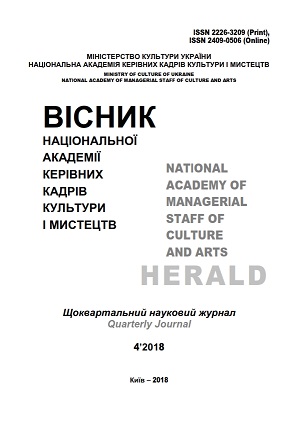Специфіка культури менеджменту Високого Середньовіччя
Specificity of the Culture of Management of the High Middle Ages
Author(s): Elena Yaroslavivna KovalenkoSubject(s): Governance, Political history, Social history, Middle Ages, Culture and social structure , Management and complex organizations
Published by: Національна академія керівних кадрів культури і мистецтв
Keywords: Culture of Management; High Middle Ages; Society;
Summary/Abstract: The purpose of the work is theoretical analysis and generalization of the peculiarities of the culture of the management of the High Middle Ages, which will contribute to the enrichment of the humanities with new knowledge about the formation of a culture of governance at the stage of prosperity of the feudal society. The methodological basis of the study is the dialectical principle of cognition, systemic, civilization, sociocultural, activity, historical approaches, fundamental provisions of the theory and history of society, its culture and management. The following general scientific and interdisciplinary research methods are used: analysis and synthesis, induction and deduction, comparison, generalization, formalization. The scientific novelty of the results obtained is the discovery and systematic generalization of the specifics of the culture of the management of the High Middle Ages. Conclusions. The high Middle Ages is characterized by the flowering of feudal relations, the domination of the estate-representative monarchy, the domains of the economy, the development of cities, crafts, commodity-money relations and central state power. The system of public administration at this stage is hierarchical with the allocation of central, regional and local levels: in the western countries – rigidly centralized, in the east – decentralized. Strengthening the power of cities has led to the development of urban law and the formation of a craft organization and a culture of crafts. The master was at the same time the owner, manager and employee, and management was based on common sense, experience and guild status. Workshops executed the petty regulation of the workshop. Identified its technology and such management functions as: organization, planning, control, provision, sale, distribution of income, hierarchy, criteria for promotion and professional training. The chain management culture was rational and progressive, but in the future it became a brake on the development of the craft. The church's canonical doctrine had a great influence on the culture of management. Canonists treated the management from the standpoint of ancient philosophy, the interests of feudal lords, class hierarchy, as well as church and royal (princely) power.
Journal: Вісник Національної академії керівних кадрів культури і мистецтв
- Issue Year: 2018
- Issue No: 4
- Page Range: 152-158
- Page Count: 7
- Language: Ukrainian

